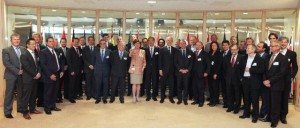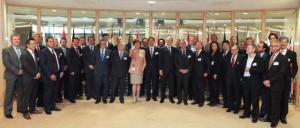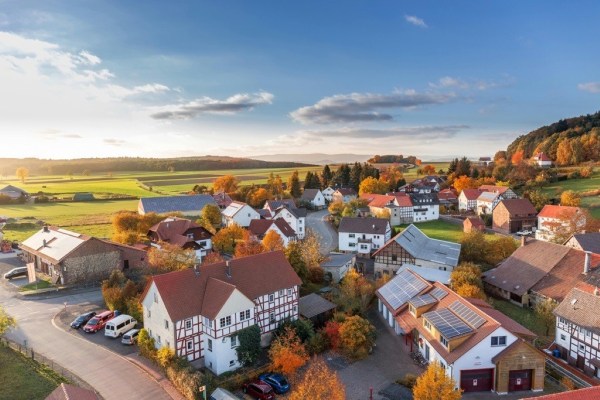 Last week, EU Commissioner and Vice-President Neelie Kroes held in Brussels the final roundtable meeting with 35 top representatives of the ICT industry to see how to foster high-speed broadband roll-out in Europe and how to achieve the ambitious European Broadband objectives for 2020.
Last week, EU Commissioner and Vice-President Neelie Kroes held in Brussels the final roundtable meeting with 35 top representatives of the ICT industry to see how to foster high-speed broadband roll-out in Europe and how to achieve the ambitious European Broadband objectives for 2020.
As you might know, with the Digital Agenda for Europe, the European Commission set targets for all European households to have download speeds of at least 30 megabits per second by 2020, with half of those households enjoying 100 mbps. Those challenging targets would place Europe next to countries like Japan or South Korea which already have superfast fibre broadband networks. This is important as broadband is widely considered to be one of the main engines and the backbone of economic growth and social innovation for the future.
Since March 2011, as requested by Commissioner Kroes, top telecom industry CEOs and CEOs from content and service providers, manufacturers and investor groups, set up 3 different working groups to develop specific proposals on how to address the broadband investment challenge in Europe. Those working groups were focusing on the Sustainability of the Internet Ecosystem, Open Access, Interoperability and Connectivity, and finally on the NGA investment framework and ways of financing these networks.
During the meeting on the 13th of July, Alcatel-Lucent, Deutsche Telekom and Vivendi, the chairs of the 3 working groups, presented 11 specific proposals to the European Commission about actions that are needed to achieve these EU’s 2020 broadband targets.
These proposals include:
– A clear support to sustainable business models and more efficient use of scarce resources. Provide incentives for players who “add value”, in order to avoid pure arbitrage strategies
– Limit regulation of operators active on the access network (layer 1), which is the most capital-intensive network operation
– Support scale and specialization and ease cross-border mergers or layer-focused investments.
– Establish a single binding European regulatory framework that leaves also room to regional circumstances
– Support traffic management differentiation to foster innovation and new services.
– Recognition that business could be two-sided, based on commercial agreements and respecting the principles of openness and non anti-competitive discrimination
– Foster innovation and investment but also consumer interest
– Promote co-investment and public funding for next-generation infrastructure in areas where competition on infrastructure doesn’t develop or where a roll-out of NGA would otherwise not be possible
– Eliminate barriers to investment by promoting measures that stimulate demand, derisk investment and reduce roll-out costs, more specially in the areas of civil works and in-house wiring
– Promote open and interoperable standards for IP-based Quality of Service Interconnection (such as IPX) as well as for next-generation bitstream access and other NGA products
– Promote symmetrical open acces to civil works and in-house wiring.
Neelie Kroes indicated that from its part, the recent Commission’s proposal for €9.2 billion to be allocated in 2014-2020 under the Connecting Europe Facility to investment in broadband and digital service infrastructures, which could leverage over €100 billion of private investment, is a step further. She also mentioned the consultation just recently launched on how to support and foster a digital single market for audiovisual content, as audiovisual content and applications are key concerning the broadband access demand.
She also concluded that finding a common ground between telecoms operators, equipment makers, technology groups and investors is hard but she will study and analyze all the proposals made during these four months of intensive work very carefully. She thanked the CEOs for their contribution to this process.
From Telefónica side, we have been fully supportive of the Digital Agenda for Europe since its launch, as this is the first time the EU has put ICT and telecom policies sector high on the European political agenda, where they belong. Telefónica is fully involved in all the pillars of the Digital Agenda contributing with new and innovative services, for the social and economic benefit of EU citizens.
We believe that broadband is key for social and economic growth for Europe, therefore we strongly push for a global agreement amongst stakeholders present in this process, taking into account the challenges we have concerning broadband in Europe.
Telefónica considers that any solutions should embrace some economic principles such as technological neutrality (no specific technology should be favored), support of competition between networks and freedom of enterprise and developing new business models as a basis.
The proposals presented last week in Brussels could show us the way to reach the Europe 2020 objectives. Time is running fast and we can not miss this train, so let’s catch it!
You can find more information on this process in the following links:
EC Press Release after the 1st CEO Meeting (March 2011)
EC Press Release after the 2nd CEO Meeting (July 2011)
Nelly Kroes Post on the CEO Meeting (July 2011)
Vivendi Press Release after the CEO Meeting (July 2011)
Carlos López Blanco, Director of the International Office at Telefónica S.A.













